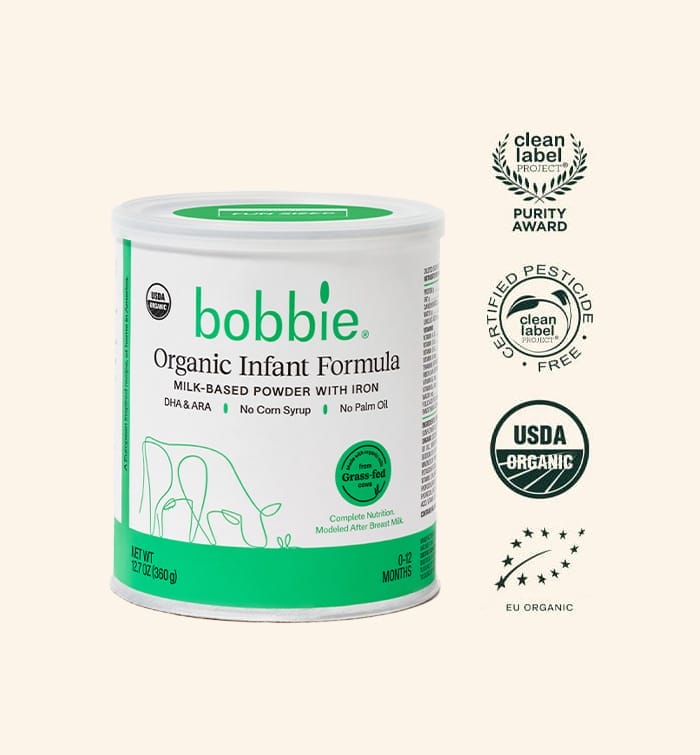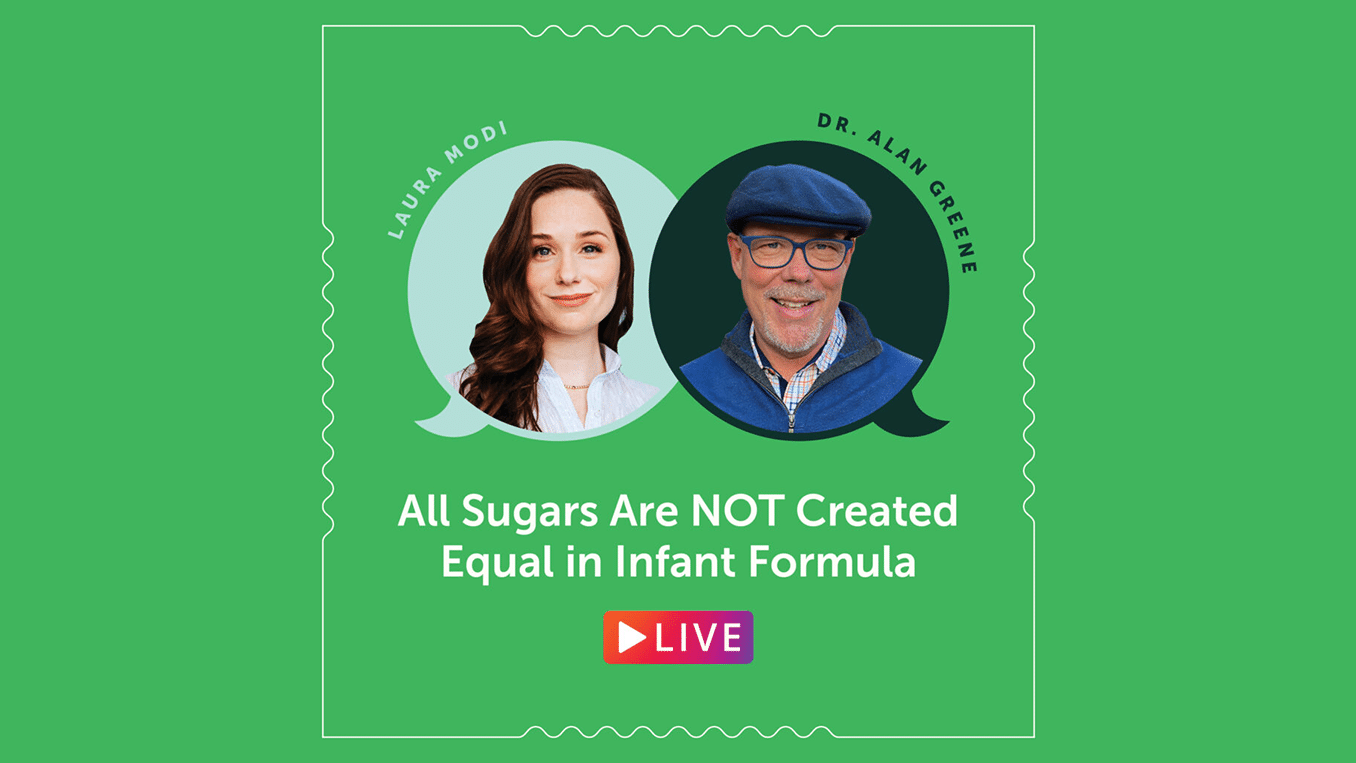We are proud to say that these posts are not sponsored. Our editorial team of Bobbie moms and writers personally select each featured product. If you buy something through our links, we may earn an affiliate commission, at no cost to you.
Bobbie’s CEO, Laura Modi, sat down (virtually) with pediatrician, seasoned author and founder of The White Out Movement, Dr Alan Greene to discuss all things feeding and sugar in infant formula. You can listen to the full session here on IG Live.
- Let’s talk about sugar in baby formula
- Corn syrup in baby formula?
- Lactose vs corn syrup in baby formula
- Is my baby lactose intolerant?
- Does my baby need sensitive formula?
- What if my baby is allergic to cow’s milk or soy in formula?
- Should you taste test your baby’s formula or breast milk?
- Formula for preemies?
Bobbie: When I became a mom, your books Raising Baby Green and Feeding Baby Green, were EVERYTHING! You were the founder of what it means to feed your baby healthy food. Now we sit on the board of a fabulous nonprofit organization together, Eat REAL.
Dr Greene: Eat Real is a wonderful organization aimed at getting kids in school to get real healthy food, as part of their education and as part of building bodies to last for a lifetime. There’s little more important to kids short term and long term health than what they eat. In many ways, the school system is the biggest restaurant in the US, and we want to make it a great restaurant.
Bobbie: The school system is the biggest fast food restaurant in this country. That is insane!
We put all of this work into developing a healthy baby, as they get into the school system that should continue.
Dr Greene: But starting right is so important! When I look at the childhood obesity epidemic, I saw, by 9 months old, 30% of Americans are overweight. So we have to look at what’s happening before 9 months to really get things going right, and then continue that in school.

Let’s talk about sugar in baby formula
Bobbie: In relation to early infant nutrition, and very specifically FORMULA, there is often a misconception that sugar is needed, and that formula needs to mimic breast milk— and a lot of sugar is found in breast milk. Why is sugar in baby formula?
Dr Greene: Added sugar is one of the biggest problems in the American diet. The sugars that are naturally found in foods can be really beneficial. One of the places they’re found naturally is in breast milk.
Breast milk is a really complex formulation with lots of little ingredients, but there are three big MACRO nutrients: fats, proteins and carbohydrates.
What is Lactose?
Within the carbohydrates, the #1 ingredient is a special type of sugar in breast milk that’s GOOD for us, it’s foundational. This is lactose. You want your baby to have a really easy to digest energy source for the major tasks of being an infant. They are putting on weight like never in life. They triple in size in the first year. In order to do that, they need the sugar source to accomplish that all. But lactose is a very special sugar that also regulates how much they eat. They will end up perfectly growing this massive amount; not too much, not too little.

Corn syrup in baby formula?
Bobbie: Let’s talk about the specifics of these types of sugars. There’s a spectrum of sugars that COULD be used in baby formula. Corn syrup is one of them. Do you think corn syrup should be used in infant formula and are there other sugars we could be using?
Dr Greene: As a pediatrician, it shocks and saddens me that corn syrup is so common in infant formula in the US. Many babies are raised on corn syrup as the primary carbohydrate in their baby formula. It’s cheaper, and we’re often driven by economics. The very special sugar in breast milk is called lactose. Lactose is different from any other sugar.
Breast milk is a variable. Meaning that it changes— even during a single feeding. The sweetness changes, too. It changes depending on where someone is born. But with all of the changes over time, culture, ethnicity, geography- there is one thing that is constant- the #1 ingredient in breast milk (whether the mom is a vegetarian, vegan, etc) is lactose.
The #1 ingredient in breast milk is LACTOSE!
Dr Greene: For every woman in history, same for every mammal, lactose is there to feed the infant. What mom is making is exactly what the baby needs.
To fly in the face of biology, nature and history, and replace it with processed corn syrup- WHAT A CRAZY IDEA!
Lactose vs corn syrup in baby formula
Bobbie: When you start to break it down, you see that @50% of formulas on the market in the US still use corn syrup as their primary carb.
Dr Greene: It’s such a crazy idea! Corn syrup is REALLY different from lactose. Corn syrup has a glycemic index of like 100, lactose is half, about 45. It really affects your blood sugar (your highs/dips). The level of sweetness is different as well. Corn syrup is a 1 (ultimately sweet), Lactose is a .2, it’s much less sweet.
What happens if we teach babies to enjoy sweet tasting food?
Dr Greene: If formula is too sweet, two things can happen.
1- Babies eat more calories the sweeter it is, which then makes them eat more.
2-It also trains babies, as our taste preferences are formed by experiences. It gives them a sweet tooth. It makes them more hungry for white flour and sweets.
I’ve been involved in trying to get white rice cereals to not be a first food for babies as well because it causes a high glycemic index, which causes insulin spikes, just like corn syrup.
Is my baby lactose intolerant?
Bobbie: A common misconception is that more babies are lactose intolerant. How does one determine if their child is lactose intolerant and is it common?
Dr Greene: True lactose intolerance is incredibly rare in babies. It’s more common in adults, but for babies it’s extremely rare!
Bobbie: So just because mom is lactose intolerant herself, it doesn’t mean her baby is?
Dr Greene: Absolutely not. There’s no correlation between normal adult lactose intolerance and baby’s lactose intolerance.
Bobbie: Less than 2% of babies do have some form of lactose intolerance, in which case they do need to find a formula which does not contain lactose.
Does my baby need sensitive formula?
Dr Greene: Talk to your pediatrician. For the great majority of healthy babies, this is a misconception that is, sadly to me, something marketers have prayed upon cynically. Babies go through a gassy and a fussy period, and somebody says “we’ve got a sensitive formula for you that doesn’t have lactose in it and your baby will be better” so parents give it a try.
What replaces lactose for lactose intolerant babies?
Dr Greene: These lactose free formulas are loaded with sugar and taste great. Babies light up when they get it. It’s super sweet. It almost acts like a drug because it makes them a little zoned out.
To me it’s a cynical thing to market that to unsuspecting parents and babies who deserve better.

Shop Bobbie Organic Infant Formula
Bobbie Organic Infant Formula is a USDA Organic, EU-style infant formula that meets all FDA requirements. It is a complete nutrition milk-based powder modeled after breast milk and is easy on tummies. It is non-GMO and doesn't have corn syrup, palm oil, or maltodextrin. Learn more about Bobbie.
What if my baby is allergic to cow’s milk or soy in formula?
Bobbie: One of the other things besides lactose intolerance is that there are babies who can’t digest certain proteins.
Dr Greene: Yes, this is more common as 3-7% of babies have intolerance to cow’s milk protein or soy protein. That’s an actual allergy and thankfully most of them will outgrow it— often by the 1st bday. For this you would use a diff protein source, but it doesn’t mean you skip the lactose.
What makes the ideal formula?
Bobbie: To recap, less than 2% of babies are actually lactose intolerant. Less than 10% have a protein deficiency. So if you’re looking for a formula, you want to find one that uses lactose as the carbohydrate source, and ideally a protein ratio that has a higher whey to casein that allows for easier digestion. Yes?
Dr Greene: Yes! I do a review for physicians each year about how to select formulas.
That’s when I first discovered Bobbie, by the way, in doing the review of formulas on the market.
You want to choose an organic formula that has lactose as the sugar. Bobbie is so great being a European style recipe that meets FDA standards. I’m thankful for what you’ve done there.
Should you taste test your baby’s formula or breast milk?
Bobbie: Do you ever recommend that parents try their own breaset milk or formula to understand the sweetness?
Dr Greene: Yes, I do!
The NY Times did a story on this and some of the formulas tasted as sweet as grape juice. I think it’s a great thing to do.
Formula for preemies?
Bobbie: When it comes to preemies, should parents look for formulas differently?
Dr Greene: Yes, babies born before 37 weeks and especially 34 weeks, do have different nutritional needs. Often breast milk will come in early which helps. You can add a human milk fortifier that premature babies need. There are also formulas formulated for that situation.
Work with your pediatrician or neonatologist to find the best formula for their level of development. By week 35-37, babies may begin to transition to where regular formula would be fine.
Introducing solid foods at around 4-6 months
Bobbie: When you start to introduce foods, at around 4-6 months, should you think of breast milk and/or formula differently? Is there a hierarchy to food coming first?
Dr Greene: This is when taste preferences for the long haul become really established.
When a baby gets something on average 6-10 times, they’re 85% likely to form a preference for it. Once babies start to walk, they get physically afraid of new flavors, new textures, new sources of food. So you want, between when they start solids and when they start walking, for them to be exposed to as many flavors of great food as you can.
For those kids on breast milk, solids are a little less important. Nurse first, then let them have as much solids as they want afterwards. For formula fed babies, as long as they’re getting plenty of formula a day, I’d start with solids to get them to try a bunch of different flavors, and then fill them up with formula.
For more information on Dr Alan Greene, visit Dr Greene’s website or Bambini Fortuna, where he is a co-founder.

Shop Bobbie Organic Infant Formula
Bobbie Organic Infant Formula is a USDA Organic, EU-style infant formula that meets all FDA requirements. It is a complete nutrition milk-based powder modeled after breast milk and is easy on tummies. It is non-GMO and doesn't have corn syrup, palm oil, or maltodextrin. Learn more about Bobbie.

